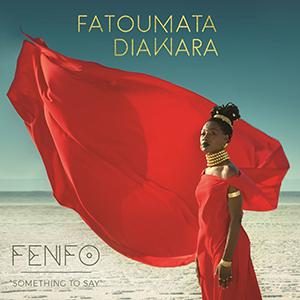Since 'Fatou', her solo debut from 2011, Fatoumata Diawara has been working on just about anything but a new solo album. The Malian beauty played a role in 'Timbuktu', a 2014 movie by Abderrahmane Sissako, recorded a live album with Cuban pianist Roberto Fonseca, and then joined the 'Lamomali' project of Matthieu Chedid aka M. It should therefore come as no surprise that Fatou once again joined forces with the French producer and composer for 'Fenfo' ("I have something to say"). Fatoumata states: "I've had so many different musical adventures since the last album, touring and working with so many other musicians and I think you can hear how all of that feeds into this record. This is my time and I'm sharing my soul!". On 'Fenfo' you'll hear Pascal Danaë on guitar, Etienne Mbappe on bass, Toumani and Sidiki Diabate on kora and Vincent Segal on cello (closing track 'Don Bo'). Fatou has clearly matured since her 2011 debut, and even though the songs on 'Fenfo' might sound light-hearted or even poppy at times, but they're certainly not void of content. On the contrary, in 'Kanou Dan Yen', Diawara speaks out against local traditions preventing the mixing of ethnic groups: "Because you are Soninke and I am Fula, I am a Jokorome and you are of the griot caste, your mother will never let us be together.". 'Bonya', on the other hand, is a call for mutual respect, more personal is 'Mum', in which the singer forgives her parents, who rejected her at the time because she refused a forced marriage: "I am a descendant of Djéneba Konaté and Bakari Diawara. Your beloved daughter greets you both... I thank you both.", and of course Fatoumata is also #Metoo, as she proves with 'Takamba', for which she used testimonials from female friends who were beaten and humiliated by their respective spouses. For opener 'Nterini', a song about two lovers who are forced to try to maintain a long distance relationship, Diawara also shot a stunning clip, directed by Ethiopian photographer and visual artist Aïda Muluneh, recorded in the remote Afar region in Ethiopia, and featuring a mix of Afro-futuristism and elements from Malian Dogon culture. West African tradition meets western electro and pop resulting in a top album!


